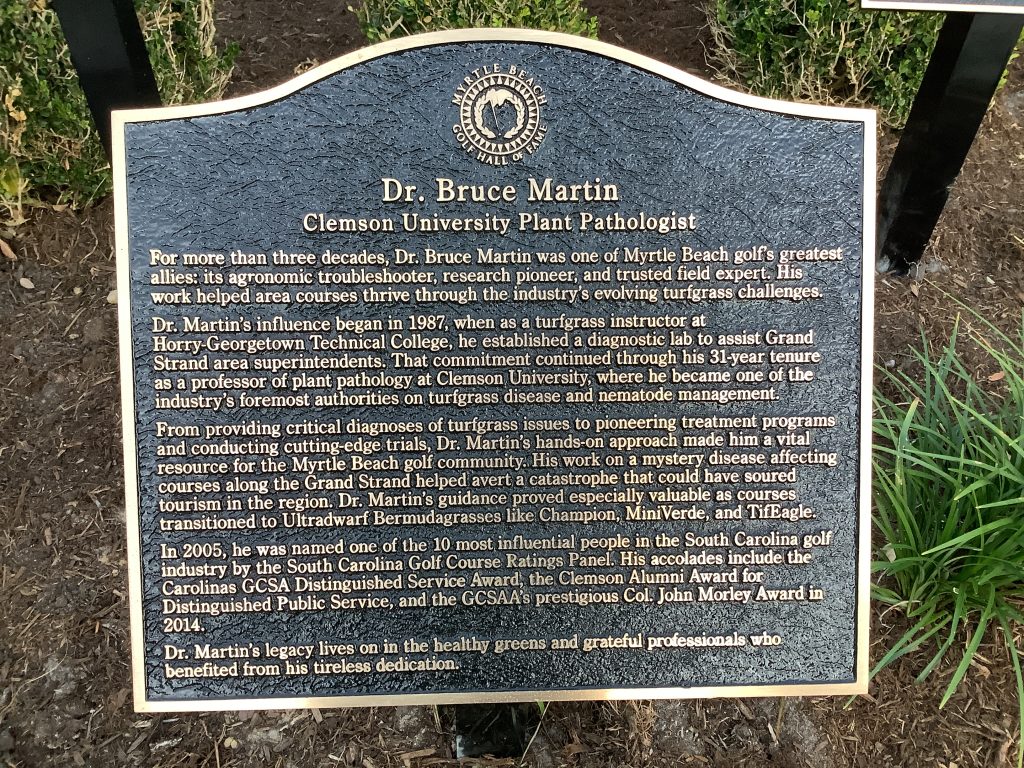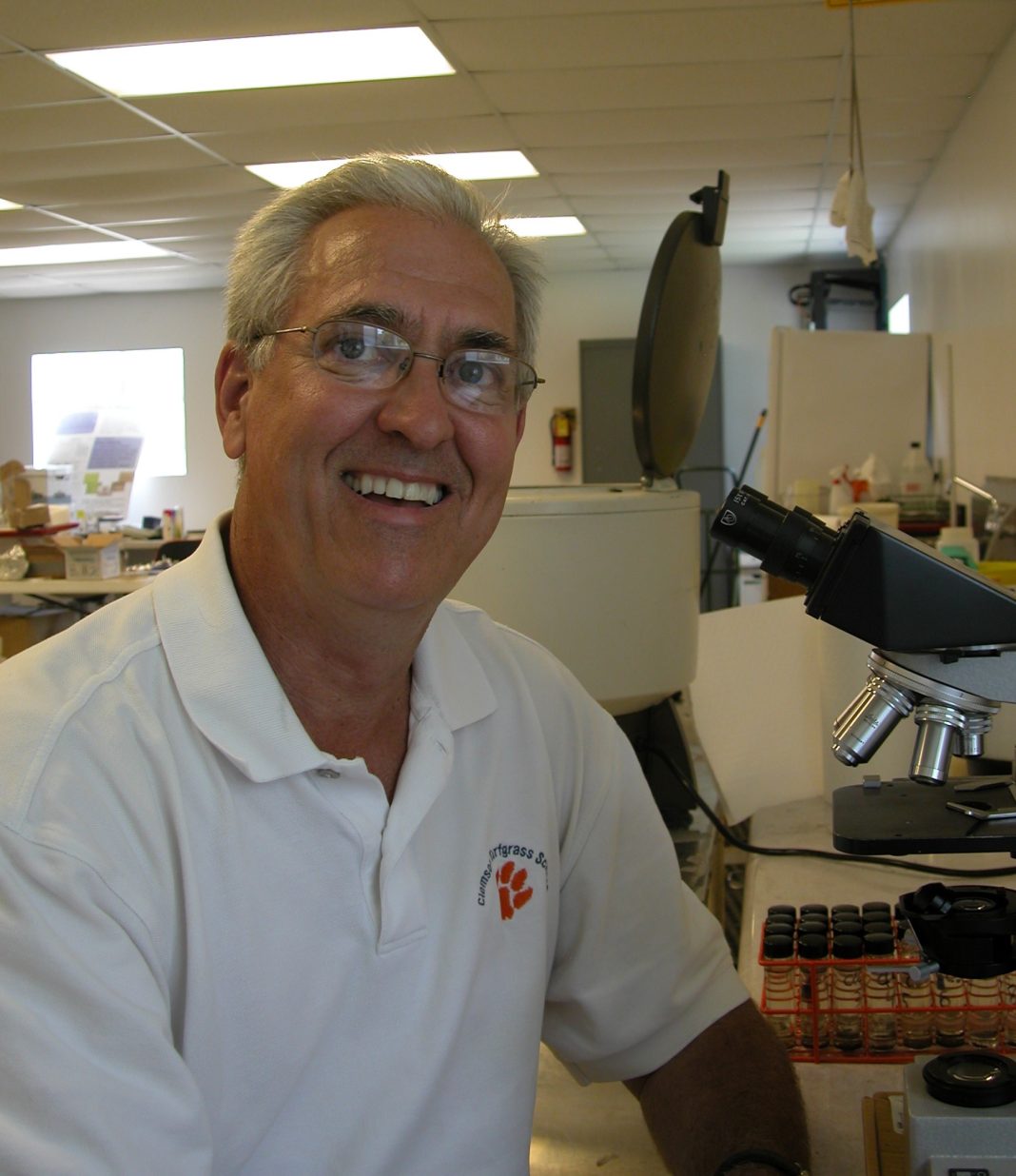Dr. Bruce Martin, a longtime plant pathologist with Clemson University based at a research facility in Florence, has died.
Martin was inducted into the Myrtle Beach Golf Hall of Fame on Sept. 24 along with longtime area superintendent and director of agronomy Arthur L. ‘Max’ Morgan Jr., in a ceremony at Pine Lakes Country Club, which houses the hall of fame garden behind the clubhouse.
Martin, who was 71, was unable to attend the ceremony due to health issues, and died on Wednesday, Oct. 15.
For three decades until his retirement in 2018, Martin helped Myrtle Beach area superintendents and course owners keep their layouts in good condition by diagnosing and recommending remedies for grass diseases, fungi and pests.
Martin and Morgan are the first members from the fields of agronomy and plant science in what is now a 38-person hall of fame.
For several reasons, the Grand Strand is an area that is particularly difficult to maintain healthy grass. Its climate falls in a transition area for warm- and cool-weather grasses, which creates stress on both at different times of the year. Bermudagrass, the predominant grass on area courses, goes dormant in the winter and courses often overseed with cool-weather grasses rye and poa trivialis. The transition periods create stress on the grasses and require a lot of maintenance. The area also had dozens of courses through the 1990s with bentgrass greens, which were stressed in summer heat.
The coastal soil is sandy, which allows for drainage but also washes away soil nutrients such as nitrogen, potassium, calcium and phosphorus that are crucial for grass growth.
The area is also often hit by tropical storms and hurricanes that damage and flood courses, and since a lot of area courses were built within housing developments, trees that have matured over the years on adjacent homeowner property restrict the sun and air flow that help Bermudagrass grow.
Martin was the go-to guy in the region to help courses overcome the challenges.
Whenever a golf course superintendent encountered dying grass or spreading disease and didn’t have an answer, they would get a sample to Martin and he’d invariably research a cure that would save the course’s condition and subsequently its financial stability.
He was particularly helpful through the proliferation of ultradwarf Bermudagrasses in the area beginning a couple decades ago, and the transition from bentgrass to the newer Bermudas on many Strand courses.
“[Martin] means a lot to us turf guys,” said Morgan, Founders Group International’s vice president and director of agronomy. “All of us had a personal relationship with him both when we were growing bentgrass and then when we converted to Bermudagrass because we thought it would be easier and it turns out it’s just as hard. Just as many fungicides and just as many pests. He’s been instrumental to me personally for 30 years.”

A leader in his field
Martin is a native of Conway, Arkansas, and earned a biology degree at Hendrix liberal arts college there. He became interested in plants in his final two years at Hendrix.
He was painting houses after graduation when he was asked if he wanted to enter graduate school, and he went on to earn a Master’s degree in plant pathology at Arkansas and later a Ph.D in turf projects from N.C. State.
He began helping the market in 1987, when as a turfgrass professor at Horry-Georgetown Technical College, he established a diagnostic lab to assist area superintendents.
At Clemson, Martin became one of the industry’s foremost authorities on turfgrass disease and nematode management. He retired after 30 years in 2018.
He provided critical diagnoses of turfgrass issues, pioneered treatment programs and conducted innovative trials to find solutions for the Myrtle Beach golf community.
His presence was valuable to area supers when courses transitioned to ultradwarf Bermudagrasses like Champion, MiniVerde, TifEagle and Sunday.
Reflecting his prominence in his field, Martin has actually named some of the diseases golf courses have battled.
In addition to solving problems with grasses in South Carolina and throughout the U.S., Martin has been summoned to numerous countries including Australia, Argentina, Brazil, England and Spain to solve issues.
In 2005, Martin was named one of the 10 most influential people in the South Carolina golf industry by the S.C. Golf Course Ratings Panel. His accolades include the Carolinas Golf Course Superintendents Association’s Distinguished Service Award, the Clemson Alumni Award for Distinguished Public Service, and the GCSAA’s prestigious Col. John Morley Award in 2014.
Funeral services are being arranged, and the family will have a memorial service on Nov. 15.











